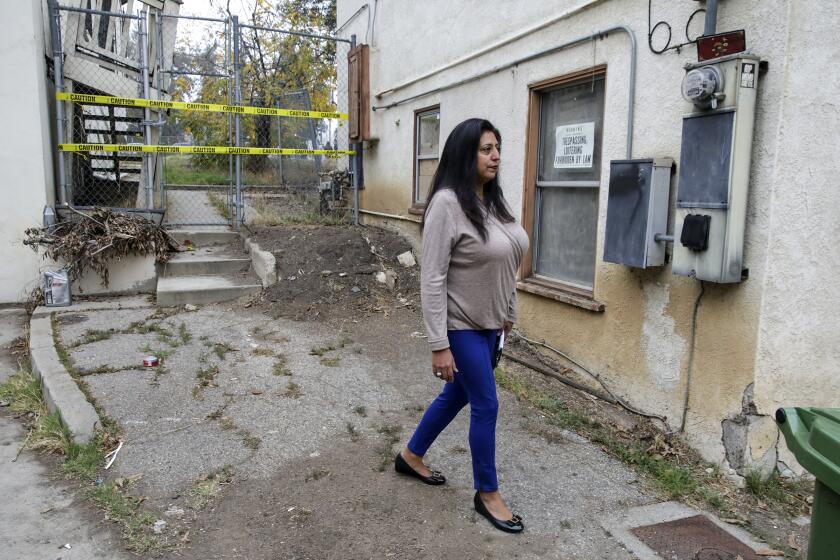In El Sereno, homicides increase amid fears of gentrification
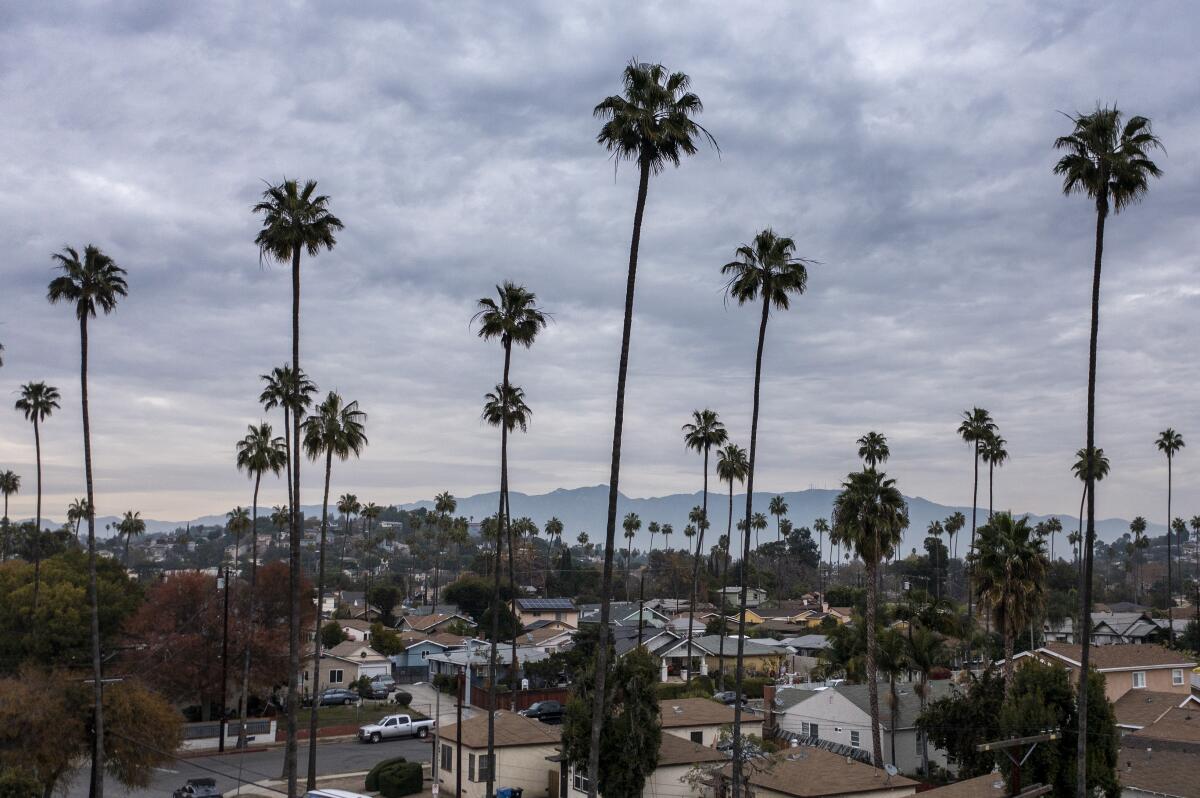
- Share via
Last summer, something other than COVID-19 began to trouble Eddi Ortiz.
Two Los Angeles Police Department detectives stopped by his coffee shop, Holy Grounds Coffee and Tea. They were investigating a shooting and wanted to review video footage from the security cameras.
Ortiz obliged but felt unsettled.
He was often hearing about cars and businesses being broken into — and now, another shooting.
Ortiz’s informal tally was confirmed by police statistics. Crime was getting worse in El Sereno, a tight-knit, majority-Latino section of Los Angeles wedged between Lincoln Heights, South Pasadena and Alhambra.
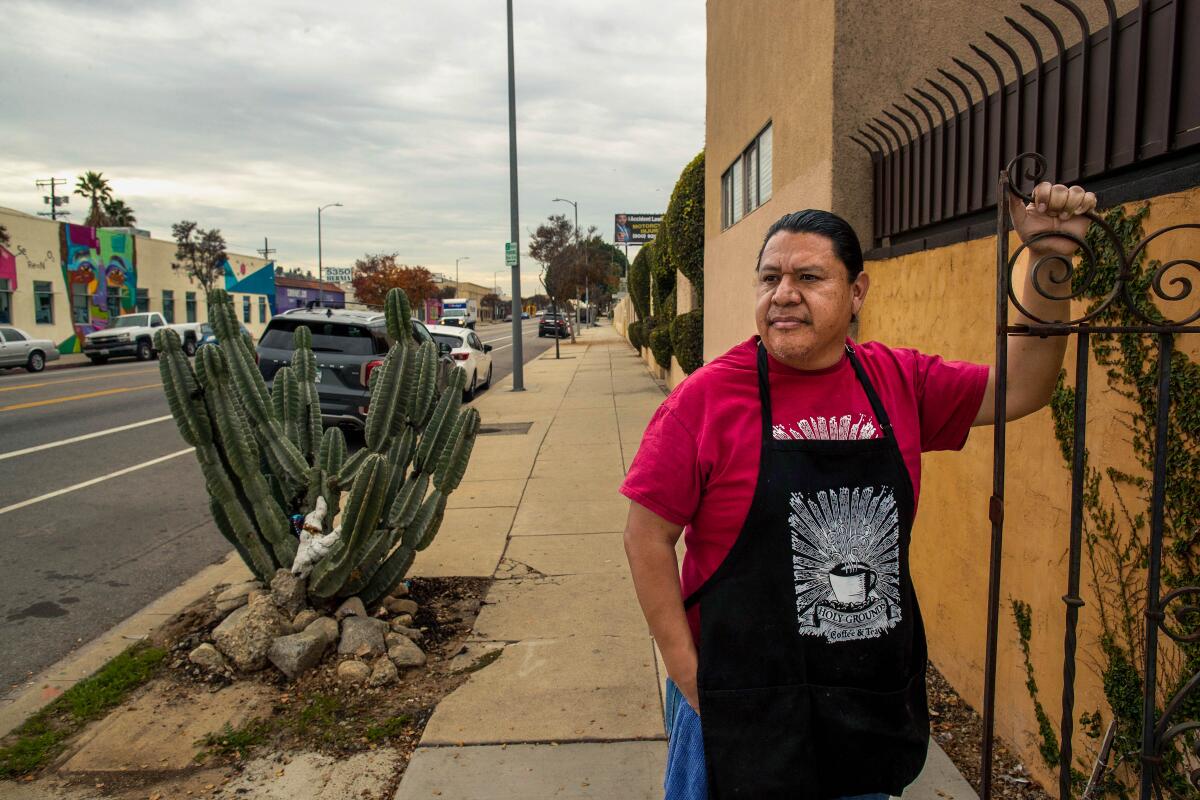
Gun violence and homicides have skyrocketed citywide in the last two years, mirroring a surge across the nation thought to be linked in part to the social instability from a once-in-a-lifetime pandemic.
In 2021, Los Angeles recorded nearly 400 homicides, the highest toll since 2007, though still well below the peaks of the early 1990s.
In El Sereno, eight people were killed last year — a marked increase from two or three in each of the last seven years, according to data compiled by The Times from L.A. County coroner’s records. Most of the homicides were gang-related, police and city officials say.
Nearly 400 people have been killed in L.A. in 2021, marking a 50% increase since 2019 and the loss of 15 years of progress driving down such violence.
“It seems like a low number, but when you take into account that El Sereno is small in comparison to other parts of the city, it’s significant,” Ortiz said of the recent killings.
As elsewhere in the city, an increase in firearms, including “ghost guns” lacking serial numbers, has helped fuel the violence.
The pandemic has hit working-class Latino neighborhoods like El Sereno especially hard, at the same time that crime and homelessness have increased.
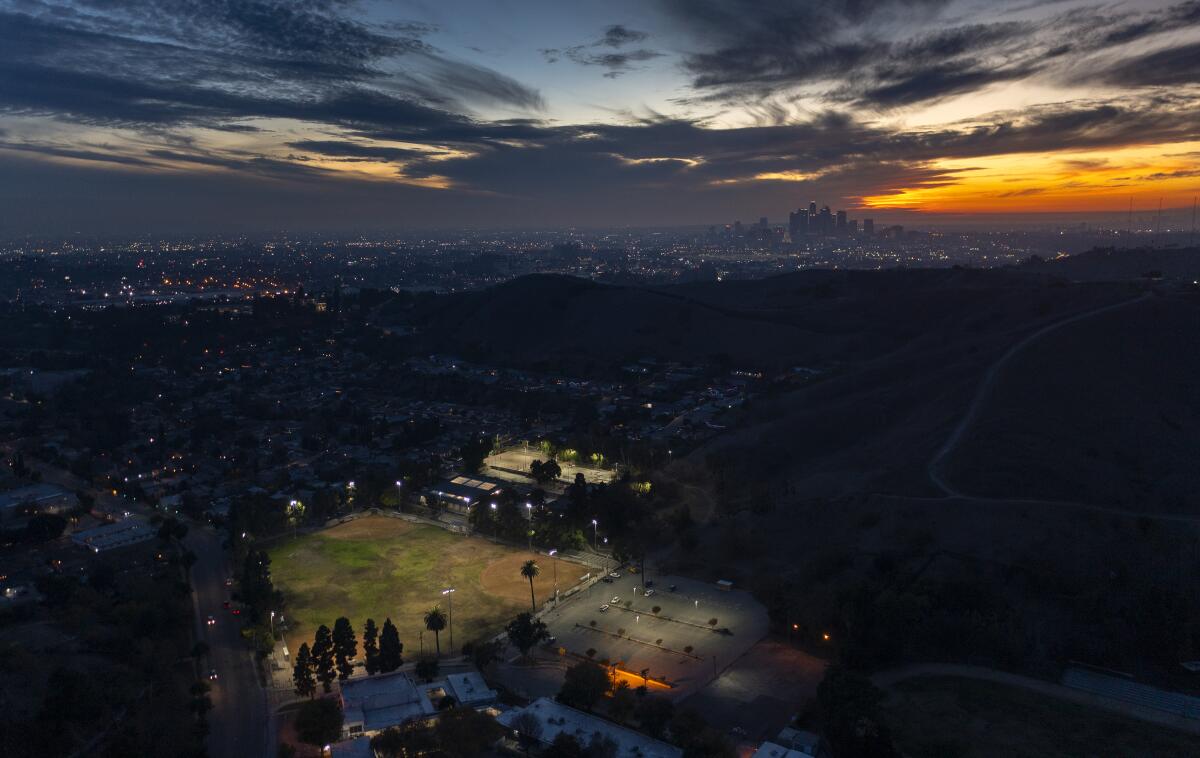
Yet even as problems mount, many longtime residents are worried about gentrification. In recent years, house flippers have been renovating homes and slapping on million-dollar price tags. License plates from Massachusetts, New York and Nevada are increasingly common.
While homeowners can benefit from higher property values, renters fear being priced out of the neighborhood of about 40,000 residents, which as of 2013 was about 82% Latino, 11% Asian and 5% white, according to census data and a Times analysis.
Indeed, a community survey sponsored by several groups and businesses last April found that El Sereno residents often listed affordable housing and homelessness as top concerns.
El Sereno is defined by its unique geography, set amid rolling hills, with Cal State Los Angeles perched at its southeastern edge. It lies on the border of Los Angeles and the San Gabriel Valley, with wealthy South Pasadena to the north.
Valley Boulevard, the iconic strip filled with restaurants serving cuisine from provinces around China, has its western terminus here.
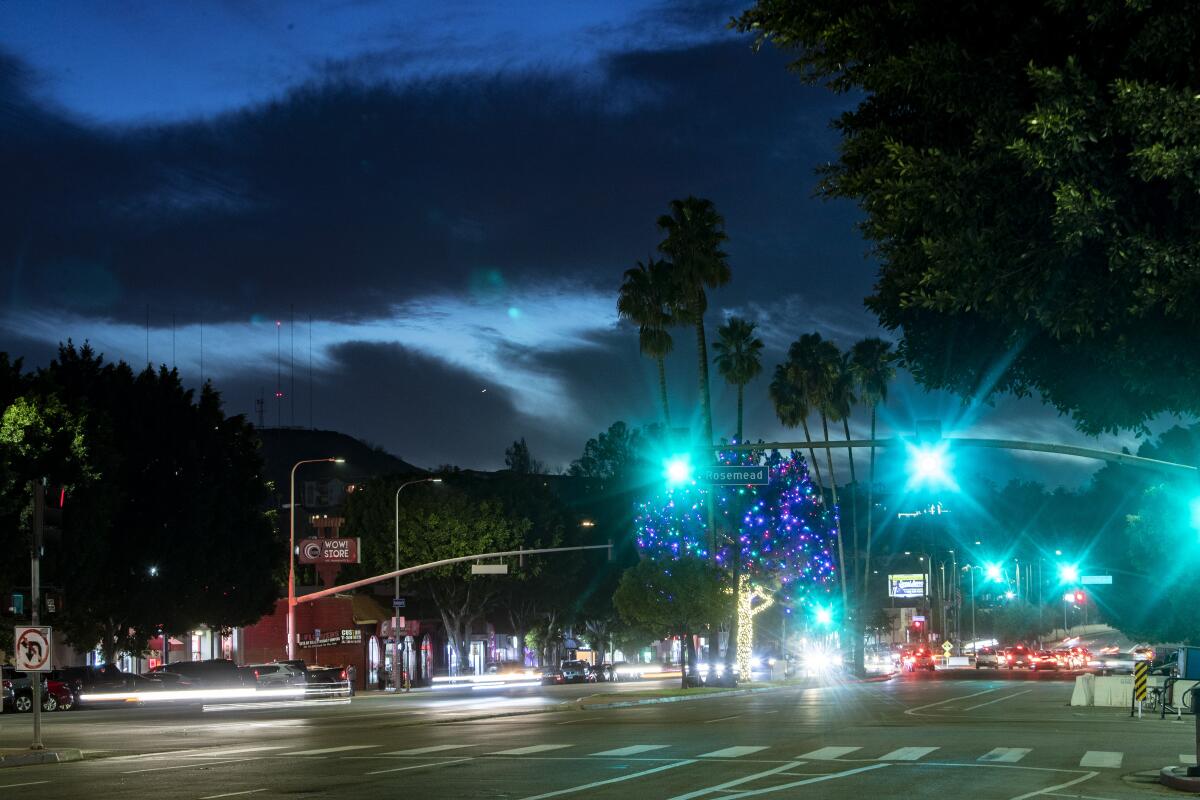
The Union Pacific track runs through the area, making passing trains a tempting target for robbers.
Here also is the stub of the 710 Freeway, the subject of a decades-long battle, with houses bought by the California Department of Transportation standing empty as El Sereno and South Pasadena residents opposed an extension to connect it with the 210 Freeway.
City and state officials unveiled a plan Friday to acquire 77 parcels from the California Department of Transportation and build affordable housing and parks in El Sereno where the 710 Freeway was once supposed to go.
Sgt. Jaime Chacon oversees the gang unit at the LAPD’s Hollenbeck Division, which includes El Sereno. He said there has been an uptick in gang feuds stemming from drug sales and train robberies.
“Everything that gets shipped from the ports passes through here, and along the route, the rail cars get broken into,” Chacon said. “Inevitably, what happens is that the gang who controls the area where the train gets hit wants their share of the cut.”
Chacon said he hasn’t seen this many shootings and homicides since transferring to Hollenbeck nearly a decade ago.
He said some crimes can be addressed by increasing patrols, but gang violence is a thornier problem because it is rooted deeply in the neighborhood’s history.
The solutions will take time and should include more gang intervention programs — where workers, often with a gang background themselves, help young people make better choices, he said.
Last year’s El Sereno homicide victims were mostly Latino men in their 30s and 40s.
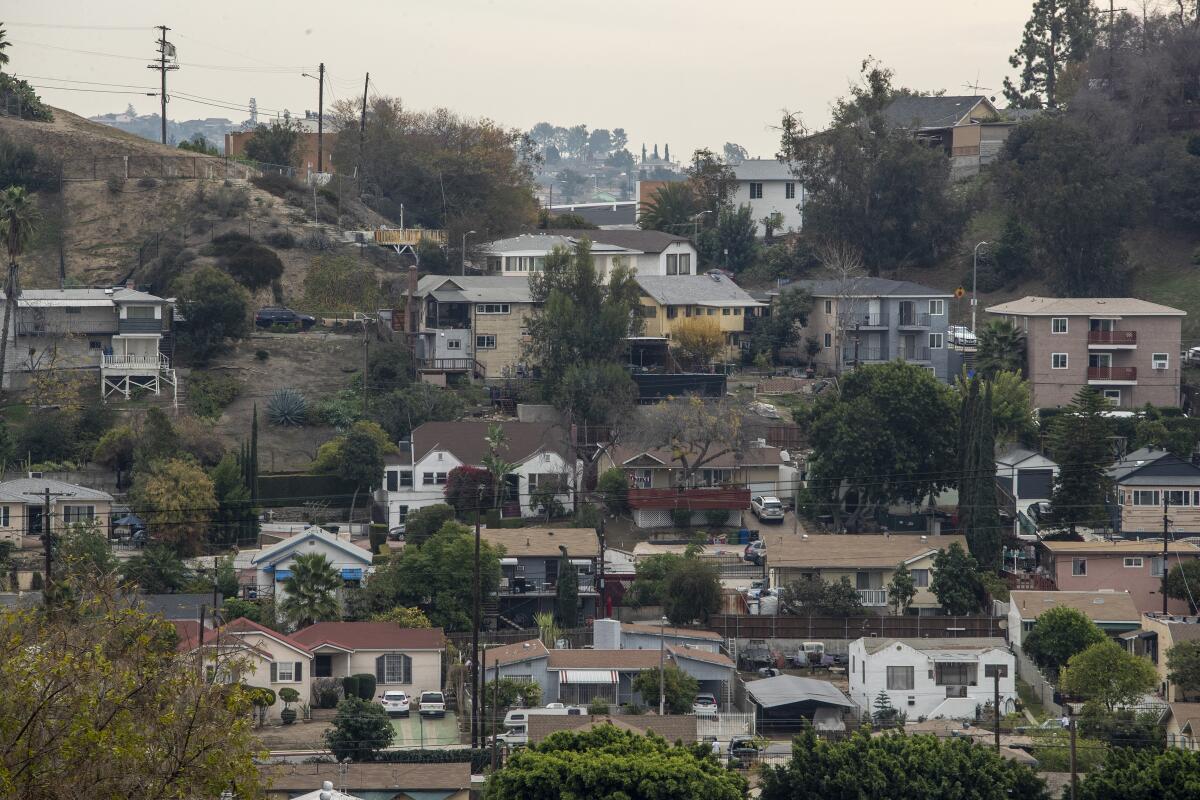
Several of them were killed along Alhambra Avenue and Valley Boulevard, which run parallel to the railroad tracks and are lined with industrial businesses and warehouses.
L.A. City Councilman Kevin de León, whose district includes El Sereno, said the pandemic has amplified existing inequities.
“We knew the inequities were there,” he said. “But the global pandemic has exposed them in such a raw manner that it’s almost Darwinistic — only the strong survive,” said De León, who is running for mayor.
He believes that has led some people to take advantage and commit crimes.
De León, a former state senator, won the council seat in 2020 after his predecessor, Jose Huizar, was suspended from office. Huizar has pleaded not guilty to federal charges including bribery, racketeering and fraud.
On Huntington Drive, a major corridor lined with restaurants, bakeries and markets, homeless encampments sprang up in recent years. Many of the people living in tents on the Huntington median had roots in the area, according to authorities and residents.
Yolanda Garcia, a co-founder of the El Sereno Historical Society, believes many crimes were linked to gangs or homeless people.
“You had some people with mental health issues walking around breaking into property and homes,” she said. “That was a big issue that had been taking place in the community.”
While most participants in the community survey said they felt safe, some pointed to homelessness, gang violence and thefts.
“I feel very unsafe when walking in my neighborhood,” one resident wrote. “I have had my car damaged while driving down Huntington Drive and a homeless person was standing in the street throwing objects at cars passing by.”
In the LAPD’s Hollenbeck Division, there was an increase in violent crimes committed by homeless residents through Oct. 23, 2021, compared with the previous year, with an almost equal number of homeless people reported as victims of violent crimes.
But both homeless suspects and victims of property crimes decreased in 2021 in Hollenbeck, according to LAPD statistics.
Shortly after he joined the City Council, De León spearheaded the purchase of two hotels to house homeless people from El Sereno, under a federally funded initiative called Project Roomkey. All but two people from the encampments moved into the hotels, De León said.
After the encampments were cleared, property crimes in the vicinity decreased, as well as robberies that had been occurring within the encampments, Chacon said.
He said the LAPD is now working with Union Pacific officials to beef up security along the railroad tracks.
“Union Pacific is very concerned about the increased cargo thefts in Los Angeles, and we have taken several steps to address this criminal activity,” Robynn Tysver, a company spokesperson, said in a statement.
On the corner of Lowell Avenue and Huntington Drive, a few yards from the Alhambra city limits, is a community garden with vegetables sprouting amid fountains and pergolas.
The garden is a hub for festivals and community events, a place where residents can exchange ideas and resources. It is also a sanctuary for a neighborhood dealing with a complex mixture of crime and gentrification, said Erika Crenshaw, its co-manager.
The area around the garden has mostly been spared from crime, except for the killing of a 30-year-old man a mile away on Huntington Drive.
But elsewhere in El Sereno, some residents and business owners remain on alert.
On a recent afternoon, two baristas at Holy Grounds took orders from a stream of customers.
Mostly, the people who stop by for a cup are longtime Latino residents.
Ortiz has lived in El Sereno off and on for more than 10 years. He helped manage the cafe before becoming the sole owner.
A few years ago, someone broke into the rear part of the cafe, which is rented to tenants. Ortiz managed to get the man, who appeared to be under the influence of drugs, to leave.
It wasn’t the only incident: A homeless man stole their tip jar. A female barista was sexually harassed on the way to work.
“As a business owner, I have to worry about the safety of the baristas,” Ortiz said. “It’s a concern I didn’t have a few years ago.”
Times staff writers Maloy Moore and Kevin Rector contributed to this report.
More to Read
Sign up for Essential California
The most important California stories and recommendations in your inbox every morning.
You may occasionally receive promotional content from the Los Angeles Times.


